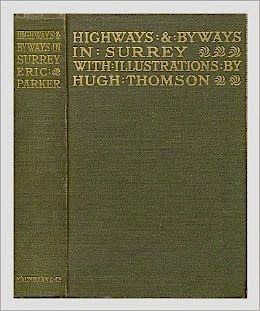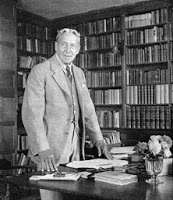This press-cutting of an obituary was loosely inserted in a copy of Highways and Byways in Surrey (Macmillan, London 1919). It is dated 14/2/55 and was probably cut from The Times. He is so far unknown to the all knowing Wikipedia despite having written many books. A recent article about him in The Guildford Dragon News is headlined Eric Parker, Who He? In the second hand book world however he is not forgotten on account of his many books, still mostly quite saleable...
Writer on Sport and Countryside
Mr. Eric Parker, a well-known writer on field sports and the countryside and an active campaigner for the protection of wild birds, died at his home near Godalming yesterday at the age of 84. He was editor of the Lonsdale Library and a former editor-in-chief of the 'Field'.
Frederic Moore Searle (Eric) Parker was born at The Grange, East Barnet, in 1870, the eldest son of Frederick Searle Parker and Elisabeth, daughter of William Wilkieson, of Woodbury Hall, Bedfordshire. He was a King's Scholar at Eton and a Postmaster at Merton College, Oxford. He took a second class Hon. Mods. in 1891, and a fourth class in Lit. Hum. in 1893. He entered journalism in 1900, when he became junior assistant editor to Theodore Cook on the 'St. James Gazette'. While still on the staff of the 'St. James's' he started to write for the 'Spectator' under St. Loe Strachey, and when St. Loe Strachey bought the 'Country Gentleman' Parker was appointed editor of that paper, coupling it with regular writing for the 'Spectator'.

The 'Country Gentleman' ceased publication in 1907. By that time Parker has written one book, 'The Sinner and the Problem', and illustrated another, A. K. Collett's 'British Inland Birds. He was always a great Surrey man, and lived in that county for most of his life, and so it was fitting that he should than have been asked to contribute the volume on Surrey to the Highways and Byways series of Messrs. Macmillian. He had a thoroughly enjoyable, thought strenuous, time in prowling about the nooks and crannies of the county, and the result, illustrated by Hugh Thomson, was by no means the least attractive of an attractive series.
College at Eton
In 1911 he became shooting editor of the 'Field' in succession to James Harting. For the next few years he was hard at work writing 'Eton in the Eighties', the first of several books he wrote about Eton - or rather about College at Eton. "Mr Parker is only an Etonian in the second place," a reviewer wrote, "In the first place he is a Colleger and to the death a member of the Election that came to Eton in the winter half of 1883".
After the first World War, in which he served with The Queen's Royal (West Surrey) Regiment, Parker returned to the work of rebuilding the shooting department of the 'Field', and in 1920 he published 'An Angler's Garland', an anthology which gave him more pleasure than any of the other anthologies which he complied. His books and anthologies came out regularly in the years that followed. One of the most delightful was 'Field, River and Hill', in which the subjects of the articles varied from Norfolk partridges to Highland grouse, and from pike in an Irish lough to trout in a Thames Backwater.
In 1928, on the death of Theodore Cook, Parker became joint editor with Lord Lonsdale of the celebrated Lonsdale Library of sport, and 15 months later succeeded Cook as editor-in-chief of the 'Field'. Four years later Parker began his great fight for the protection of wild birds. What he wrote about the common practice of trapping and caging linnets, goldfinches and other birds contributed in no small measure to the passage of the Wild Birds Protection Act of 1933.
In December, 1937, after holding the appointment for eight years, Parker resigned from the editorship of the 'Field' to devote more time to his literary work and to board casting. He had been associated with the 'Field' for 30 years, and was offered and accepted a seat on the board. His last days as editor were marked by the organisation of the British Game Exhibition in Berlin.
He married in 1902 Ruth Margaret, daughter of the late L. Messel. She died in 1933. They had four sons and two daughters. Two sons were killed in the 1939-45 War.


He was fired from the post of shooting editor at The Field. Not.
The posting from Anonymous may have been intended as a pun, but it was not far off target. Parker was indeed replaced as Shooting Editor, at The Field, but only because after a change of ownership he was offered and took over as successor to Theodore Cook as Editor-in-Chief. He could have stayed where he was and worked under a much younger Acting Editor. Eric Parker was such a gentle man that I have never been comfortable with his love to killing wild birds. He came to realise in the early thirties that this was wrong and he put away his guns for ever.